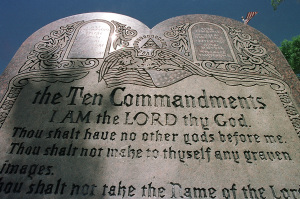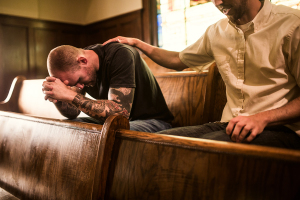Jesus is never the author of doubt

It is natural for human beings to doubt God, whereas it is supernatural for Christians to have saving faith in Christ (John 3:6; 1 Cor. 12:3). In other words: To doubt is human, to trust Jesus is divine.
Some doubts, of course, are useful. For example, it is wise to be skeptical about questionable religious claims. Doubts about the Gospel or the Bible, on the other hand, are like weeds in the garden of your soul.
Scripture states: “He who doubts is like a wave of the sea, blown and tossed by the wind” (James 1:6). Doubts can cause us to feel unstable, unsure and afraid. In the Bible, doubts about God are never seen as a virtue.
The Apostle Peter exercised great faith when he stepped out of the boat to walk to Jesus on the water. The wind and the waves, however, led Peter to doubt and become afraid. Peter then began to sink.
“He cried out, ‘Lord, save me!’ Immediately Jesus reached out his hand and caught him. ‘You of little faith,’ Jesus said. ‘Why did you doubt?’” (Matthew 14:30,31).
For that matter, why do any of us doubt? I suspect most of our doubts come from taking our eyes off Jesus and fixating on whatever storm clouds lie before us. Peter began to doubt “when he saw the wind…” (v. 30).
Many situations in life stir up doubts. Regardless of the circumstances, Jesus is never the author of doubt. We are the ones who introduce doubt into the equation.
The Lord does just the opposite. Jesus is “the author and perfecter of our faith" (Hebrews 12:2). Just as “it is impossible for God to lie” (Hebrews 6:18), it is also impossible for God to doubt.
While doubt is generally not our friend but our adversary, there are certainly times when prudence calls for investigation and a cautious approach.
For example, the Apostle Thomas refused to accept that Jesus had risen from the dead until he was given solid evidence. Once Thomas was in the presence of the risen Lord, his doubts evaporated.
The moniker “Doubting Thomas” seems to suggest a failing on his part, when really Thomas should be commended for his astute approach. Thomas was not about to jump to conclusions. He wanted to see the evidence for himself, which the Lord was happy to provide.
The risen Savior told Thomas: “Put your finger here; see my hands. Reach out your hand and put it into my side. Stop doubting and believe” (John 20:27). The time for investigating was over. It was time for Thomas to believe that Christ had indeed risen from the dead.
This is the right way to deal with any doubts you may have about Jesus, the Gospel, salvation, Scripture, the doctrine of the Trinity, etc. Examine the evidence with an open mind, and then step out of the boat.
Thomas and some other apostles willingly became martyrs after they had seen the risen Christ. Their faith stood firm upon the Rock, which is Christ Himself (Matthew 16:18).
Christianity is not a blind faith, but rather, a faith rooted in the historical events of the cross and the empty tomb. And there is plenty of evidence upon which to base your decision concerning the resurrection of Jesus Christ.
Faith looks to the Lord in spite of any faltering feelings or lingering doubts. “Let us fix our eyes on Jesus, the author and perfecter of our faith” (Heb. 12:2). As we gaze upon our Savior and meditate upon God’s Word, our faith is strengthened through the power of the Holy Spirit.
In this world, doubts can be a daily distraction. When we enter Heaven one day, our faith will be turned to sight, and our doubts will be a thing of the past. The “new Heaven and new earth” will be “the home of righteousness” (2 Peter 3:13) without disease, death or doubts. Paradise will be perfect in every way!
In the meantime, it is not the strength of our faith that delivers us, but rather, the strength of our Savior who surrounds us with His eternal love and protection. We are secure in Christ even if we don’t always feel completely secure. Thankfully, our unpredictable feelings and emotions are unable to sever our eternal relationship with Christ.
With all of this in mind, the last thing we should ever do is look down on someone who has doubts about God or the Bible. After all, who are we to judge anyone?
Instead, Scripture instructs us: "Be merciful to those who doubt” (Jude 1:22). And remember that whatever “measure of faith God has given you" is a gift from God (Romans 12:3). “For who makes you different from anyone else? What do you have that you did not receive? And if you did receive it, why do you boast as though you did not?” (1 Cor. 4:7).
If we are going to “live by faith and not by sight” (2 Cor. 5:7), we will need the Holy Spirit to produce faith in our heart through the inspired Word of God. “Faith comes from hearing the message, and the message is heard through the word of Christ” (Romans 10:17).
The next time waves of doubt come crashing down upon you, remember Peter who cried out, “Lord, save me!” We too can call on the Lord when we experience feelings of desperation. Our loving Savior has no intention of allowing us to drown. Jesus is with us, even when waves of doubt are threatening to overwhelm us.
What a mighty God we serve! And what a loving Savior we have in Jesus, “the author and perfecter of our faith” (Hebrews 12:2).
Dan Delzell is the pastor of Redeemer Lutheran Church in Papillion, Nebraska.




























